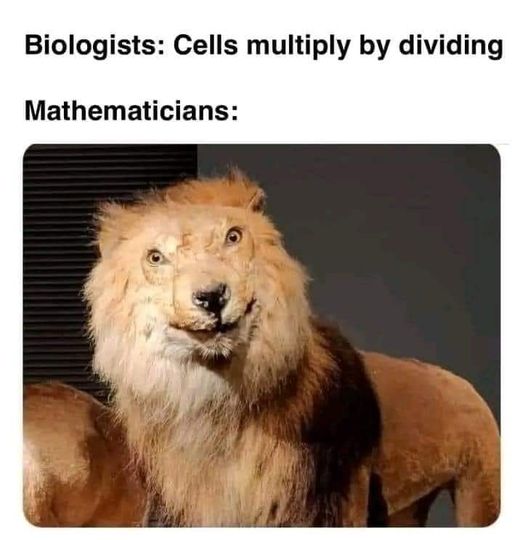this post was submitted on 10 Apr 2024
693 points (96.0% liked)
Science Memes
10377 readers
4223 users here now
Welcome to c/science_memes @ Mander.xyz!
A place for majestic STEMLORD peacocking, as well as memes about the realities of working in a lab.

Rules
- Don't throw mud. Behave like an intellectual and remember the human.
- Keep it rooted (on topic).
- No spam.
- Infographics welcome, get schooled.
Research Committee
Other Mander Communities
Science and Research
Biology and Life Sciences
- [email protected]
- [email protected]
- [email protected]
- [email protected]
- [email protected]
- [email protected]
- [email protected]
- [email protected]
- [email protected]
- [email protected]
- [email protected]
- [email protected]
- [email protected]
- [email protected]
- [email protected]
- [email protected]
- [email protected]
- [email protected]
- [email protected]
- [email protected]
- [email protected]
- [email protected]
- [email protected]
- [email protected]
- !reptiles and [email protected]
Physical Sciences
- [email protected]
- [email protected]
- [email protected]
- [email protected]
- [email protected]
- [email protected]
- [email protected]
- [email protected]
- [email protected]
Humanities and Social Sciences
Practical and Applied Sciences
- !exercise-and [email protected]
- [email protected]
- !self [email protected]
- [email protected]
- [email protected]
- [email protected]
Memes
Miscellaneous
founded 2 years ago
MODERATORS
you are viewing a single comment's thread
view the rest of the comments
view the rest of the comments

Multiplication and division are inverse operations, you can express one as the other, like expressing addition as the subtraction of a negative.
IIRC you can do this with integration and differentiation too but I've never tried it and also I'm personally not entirely sure if that's true or if it's something someone tried to convince me is good enough for work funded by taxes when trying to apply integrals and derivatives in an engineering project
from a practical perspective, you can mostly think of integration and differentiation as inverse operations. (it works fine for most functions that come up in most applications.)
but this doesnt really hold true in general. a famous example is that the gaussian distribution (used to make bell curves) is an integral that cannot be solved by using differentiation to "undo" integration. the general problem is that its a lot easier for a function to be integrable than it is for a function to be differentiable. (all continuous functions are integrable, but not all continuous functions are differentiable. even more troubling, there are integrable functions that aren't even continuous.)